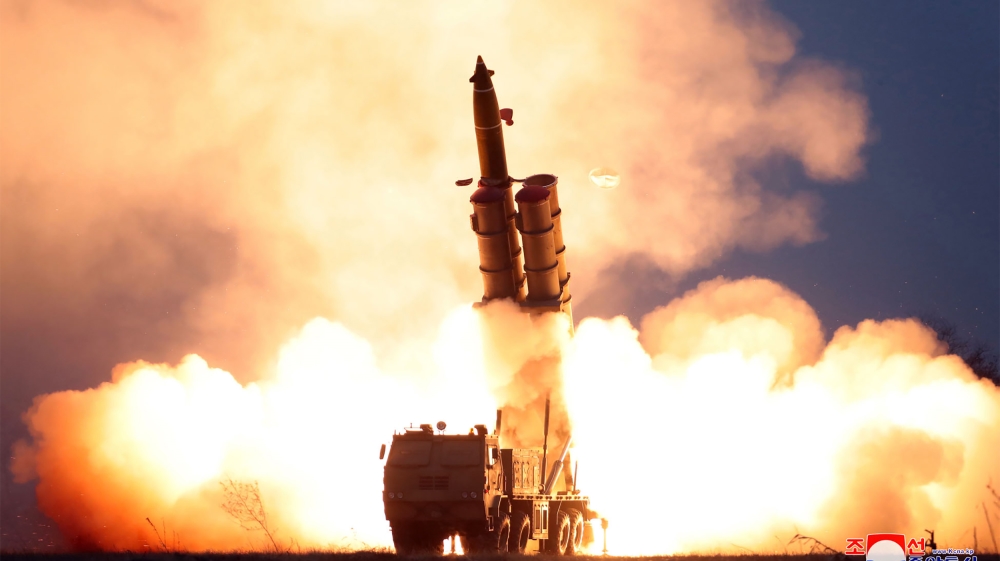US: N Korea missile tests are ‘deeply counterproductive’
Missiles tests seen as a way for North Korea to increase pressure on the US with nuclear talks stalled.

The United States warned North Korea on Wednesday that its “deeply counterproductive” ballistic missile tests risk closing the door on prospects for negotiating peace, but said it is “prepared to be flexible” and take concrete, parallel steps with Pyongyang towards an agreement.
US Ambassador Kelly Craft delivered the message at a Security Council meeting less than three weeks before North Korean leader Kim Jong Un‘s end-of-December deadline for the Trump administration to come up with new proposals to revive nuclear diplomacy.
Keep reading
list of 3 itemsNorth Korea’s Kim rides through snow as nuclear deadline looms
‘Dotard’: North Korea revives Trump taunt as hope for talks dims
“Missile and nuclear testing will not bring the DPRK greater security,” Craft said, referring to North Korea by its official name, the Democratic People’s Republic of Korea.
“We trust that the DPRK will turn away from further hostility and threats, and instead make a bold decision to engage with us,” she said.
Negotiations faltered after the US rejected North Korean demands for broad sanctions relief in exchange for a partial surrender of its nuclear capabilities during the second summit between Kim and US President Donald Trump in February.
|
|
‘Christmas gift’
North Korea has carried out 13 ballistic missile launches since May to pressure Washington, and has promised an ominous “Christmas gift” if the US does not come up with concessions by the end of the year.
Hinting at further sanctions, Craft said: “If events prove otherwise, we, this Security Council, must all be prepared to act accordingly.”
Craft appeared to rule out meeting North Korea’s demands in the year’s final weeks, saying: “Let me be clear: The United States and the Security Council have a goal – not a deadline.”
Kim and Trump agreed to work towards peace, healing the wounds of the Korean War, and achieving the denuclearisation of the Korean Peninsula when they held their first summit in Singapore in June 2018.
The council met for the second time in a week on North Korea’s increasing ballistic missile and nuclear-related activities, this time at the request of the US, which effectively blocked a council discussion on North Korea’s dismal human rights situation expected on Tuesday.
Stephen Biegun, the Trump administration’s special representative for North Korea, briefed the 15 council members over a private lunch, but left Craft to address the open council meeting.

North Korea did not speak at the meeting but China, a key ally, called on Washington and Pyongyang to work together to keep tensions from escalating, and to nurture the rapprochement they had made over the last two years.
“Seize the hard-earned opportunity,” Chinese Ambassador Zhang Jun said, calling on the two sides “to prevent the dialogue process from derailing or backpedalling.”
‘Not too late’
China and Russia, which had cautiously backed pressure against North Korea after its past nuclear tests, indicated they would reject further sanctions.
“The Security Council must revisit sanctions to alleviate the suffering of the North Korean people and create a fruitful environment for dialogue,” Zhang said.
Russia’s UN ambassador, Vassily Nebenzia, faulted US diplomacy, saying: “You can’t reach an agreement if you don’t propose anything in exchange.”
But Japan and South Korea both put the onus on North Korea.
South Korea – whose dovish president, Moon Jae-in, paved the way for Trump’s outreach to Pyongyang – urged its neighbour to abide by Security Council resolutions.
North Korea should “remain meaningfully engaged in dialogue with the United States and (South) Korea so that progress in negotiations can lead to concrete results,” said its ambassador, Cho Hyun.
France and the United Kingdom, which both wield veto power on the Security Council, also called on North Korea to seize the opportunity for diplomacy
“It is not too late,” Karen Pierce, the British ambassador, said, addressing North Korea. “You can stop this situation from worsening.”